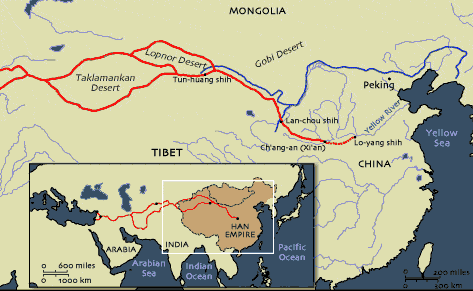Central Asia's silk roads re-spun by China
 Wednesday, September 15, 2010 at 12:05AM
Wednesday, September 15, 2010 at 12:05AM 
Nice sensible piece by Parag Khanna in the NYT.
Gist:
The fate of the massive deposits of lithium recently discovered in Afghanistan is destined to be no different from that of landlocked Central Asia’s other natural resources: tapped by the West, and eventually controlled by the East.
Siberian timber, Mongolian iron ore, Kazakh oil, Turkmen natural gas and Afghan copper are already channeled directly to China through a newly built East-bound network that is fueling the rapid development of the world’s largest population.
China’s head-start in building roads, railways and pipelines across Central Asia creates an opportunity for the West — and the region itself. Rather than engaging in a high-stakes competition for Central Asia’s valuable resources — a new round of the 19th century Great Game — the West should support China’s initial steps by coaching local governments on how to expand textile and agricultural exports and avoid the resource curse that blights many developing, one-commodity nations.
China has paved the way to finally open up landlocked Central Asia, and the West should build on its success, creating a new, oil-fueled, East-West Silk Road.
Oil pipelines from the Caspian Sea across Kazakhstan, the recently opened gas pipeline from Turkmenistan via Uzbekistan and Kazakhstan, and other planned roads and railways across Russia as well as down to the deep sea port of Gwadar in Pakistan are all part of China’s effort to turn Central Asia from a region of buffer states into a transit corridor between East and West. Beijing’s leaders have rightfully looked to Eurasia as a rich source of natural resources to fuel their booming economy.
Rather than think of China’s moves into Central Asia — and into Africa — as a suspicious form of neocolonialism, Western countries should focus on how to use Chinese-built roads and railways to make their own floundering regional strategy a success. This means cooperation rather than competition, and it can happen through heavy infrastructure investment, building new lines on the map that transcend arbitrary borders and bring real economic value.
As a longtime argument of mine (globalization: "the last in, the next [phase of frontier integration] to begin"), I couldn't agree more. I still spend a good chunk of my current brief arguing that we need to widen our perspective on potential allies in shrinking the Gap. Lotsa times, I feel stupid still making this arguments almost a decade after I started using the slides, but this is still somewhat radical thinking in a US national security establishment that prefers its China as a threatening near-peer competitor. Why? No China threat, no good argument on keeping the Leviathan fat dumb and happy in acquisitions while continuing to starve the SysAdmin.
 Central Asia,
Central Asia,  China,
China,  connectivity | in
connectivity | in  Citation Post |
Citation Post |  Email Article |
Email Article |  Permalink |
Permalink |  Print Article
Print Article 









Reader Comments